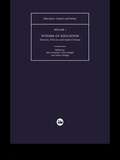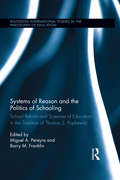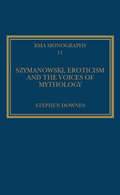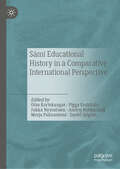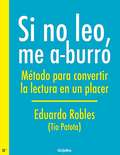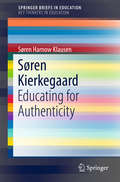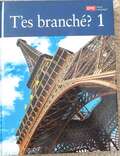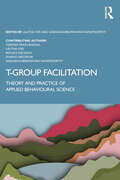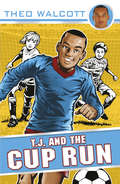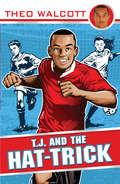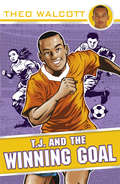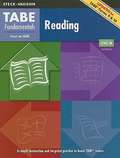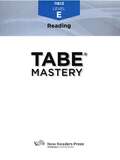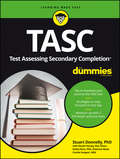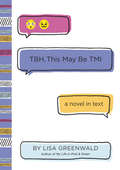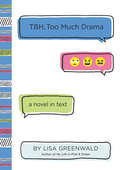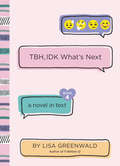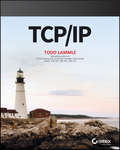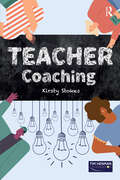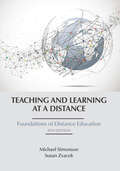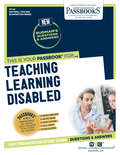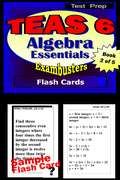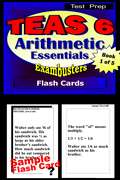- Table View
- List View
Systems of Education: Theories, Policies and Implicit Values
by Mal Leicester Sohan Modgil Celia ModgilVolume 1 is concerned with the theoretical and conceptual framework for reflecting about values, culture and education and thus provides an introduction to the series as a whole. It provides state and policy level analysis across the world.
Systems of Reason and the Politics of Schooling: School Reform and Sciences of Education in the Tradition of Thomas S. Popkewitz (Routledge International Studies in the Philosophy of Education)
by Miguel A. Pereyra Barry M. FranklinThe 1980s were an important decade for educational inquiry. It was the moment of the “linguistic turn,” with its emphasis on the role of language as a constructor of reality, a structuring agent for institutions such as schools, and a medium for translating knowledge into elements of power for processes of social regulation. Drawing on the work and insights of educational researcher Thomas S. Popkewitz, this book shows how the linguistic turn provided an alternative to both mainline educational research grounded in the ideals of political liberalism and the effort of neo-Marxists to challenge liberal thinking in favor of a scholarship based on class conflict and economic determinism.
Szymanowski, Eroticism and the Voices of Mythology
by Stephen DownesThe desire to voice the artistic revelation of the truth of a precarious, multi-faceted, yet integrated self lies behind much of Szymanowski's work. This self is projected through the voices of deities who speak languages of love. The unifying figure is Eros, who may be embodied as Dionysus, Christ, Narcissus or Orpheus, and the gospel he proclaims tells of the resurrection and freedom of the desiring subject. This book examines Szymanowski's exploration of the relationship between the authorial voice, mythology and eroticism within the context of the crisis of the modern subject in Western culture. Stephen Downes analyses mythological and erotic aspects of selected songs from the composer's early career, moving to an interpretation of the voice of the homoerotic lover, embodied as a mad muezzin, in terms of heroic notions of Orphic elegy. Discussing the encounters of King Roger with the voices of Narcissus, the Siren and Dionysus, Downes shows how the composer uses the unifying Christ/Eros figure as a means of indicating that the King might be transformed from anguished despot to loving expressive subject. The book ends with an examination of Szymanowski's desire to fuse Slavonic and Middle-Eastern mythological inspirations in an attempt to fulfil a utopian vision of a pan-European culture bound together by the spirit of Eros.
Sámi Educational History in a Comparative International Perspective
by Merja Paksuniemi Otso Kortekangas Pigga Keskitalo Jukka Nyyssönen Andrej Kotljarchuk David SjögrenThis book provides a comprehensive overview of Sámi education in a historical and internationally comparative perspective. Despite the cross-national character of the Sámi population, academic literature on Sámi education has so far been published within the different nation states in the Sámi area, and rarely in English. Exploring indigenous educational history around the world, this collection spans from Asia to Oceania to Sápmi and the Americas. The chapters frame Sámi school history within an international context of indigenous and minority education. In doing so, two narrative threads are established: both traditional history of education, and perspectives on the decolonisation of education. This pioneering book will appeal to students and scholars of Sámi education, as well as indigenous education around the world.
Sí no leo, me A- burro
by Eduardo RoblesEl camino más sencillo y duradero para fomentar la lectura es convertir el niño y al joven en lector por placer y no por deber, haciendo de esta costumbre un hábito para toda la vida. Veinte años respaldan la metodología "Si no leo me a-burro", aplicada en infinidad de instituciones públicas y privadas de varios países, con estudiantes de todos los niveles, desde preescolar hasta universidad. Eduardo Robles Boza -mejor conocido como el "Tío Patotas", escritor y cuenta-cuentos- vierte en estas páginas toda su experiencia, facilitando al maestro y al padre de familia las técnicas que harán del niño o el joven un auténtico lector, asiduo, por convicción y no por imposición. Lo que aleja al alumno de la lectura es el carácter obligatorio y aburrido con que se le asocia: significa estudio o tarea, cuando no castigo#
Søren Kierkegaard
by Søren Harnow KlausenThis book is a succinct guide to Søren Kierkegaard’s contribution to educational thought. Kierkegaard is not usually known as an educational thinker, but the book shows how his key notions and ideas are nevertheless highly relevant to educational theory and practice. It places them within the context of Kierkegaard’s philosophy and the philosophy of his time, while also exploring their significance to issues of contemporary concern, like the question of how far education should aim at fostering useful skills or support more ambitious goals. The central topics are Kierkegaard’s diagnosis of the limitations of objective knowledge and his corresponding emphasis on know-how, personal appropriation and subjective attitude; his analysis of more or less successful forms of self-realization; his ideas about fostering personal development through “indirect communication” and dialogue; and the elements, strengths and shortcomings of the ideal of self-cultivation (German Bildung).
T-Group Facilitation: Theory and Practice of Applied Behavioural Science
by Lalitha Iyer Sharad Sakorkar Sankarasubramanyan Ramamoorthy Tejinder Singh Bhogal Renuka Raj SinghThis book offers the core conceptual base for the practice of T-Group facilitation. Drawing from the fields of psychology, social psychology, sociology, diversity studies and Indian philosophical thoughts, this book is a great resource for enhancing the practice of T-Group facilitation, for both budding and established facilitators. It covers a wide range of theories on human development, self-awareness, interpersonal interactions, groups and change. Individual and group identities, diversity, inclusion and social hierarchies are explored in detail here. The authors offer a model of T-Group facilitation based on 50 years of experience within the Indian Society for Applied Behavioural Science (ISABS). This model is useful not only for fellow practitioners of T-Groups but also for anyone engaged in facilitating groups, organizations and communities globally. This book helps one to reflect, develop and sharpen one’s competencies, values and ethics in this field. The chapters are embedded with activities, quizzes, case studies and exercises to facilitate a deeper understanding of the various elements used in the book. This book will be of interest to students, teachers and practitioners of psychology, social psychology, management studies and organizational development. It will also be useful for T-Group facilitators, facilitators of experiential groups and related fields.
T.J. and the Cup Run (T.J. (Theo Walcott) #3)
by Theo WalcottTJ and his friends get a terrible shock when their old teacher, Mr Potter, returns from illness to take over from Mr Wood as PE teacher at Parkview School. Worse still, they are about to play in the semifinal of the Cup, and Mr Potter's really bad tactics nearly lose them the match.With everything they've trained for hanging in the balance, can TJ and his friends turn things around and win?
T.J. and the Hat-trick (T.J. (Theo Walcott) #1)
by Theo WalcottTJ is a new boy at Parkview School and he's never played in a proper football match before, but he soon makes friends with a bunch of football-mad kids.The trouble is, none of the teachers at Parkview are interested in football and the kids have nowhere to play - until Mr Wood arrives. With Mr Wood's help - and with the assistance of Mr Wood's old friend, Marshall Jones, a Premier League footballer - the kids and their parents mend their pitch, begin to put together a brilliant football team, and start to turn the school into a place to be proud of.
T.J. and the Penalty (T.J. (Theo Walcott) #2)
by Theo WalcottTJ's friend Jamie is the heart and soul of the Parkview football team, but although he's a great tackler his passes are dangerously random - and he can't resist the stodgy food that his mum and the school cook love to tempt him with. Jamie becomes so unfit that Mr Wood drops him from the team, so his friends and their parents organize a World Food and Football day to try and change his eating habits - and to impress the Inspectors who seem to think Parkview is not a very good school. Jamie works really hard to get fit, and finally regains his place in the team, but only when he accepts his true vocation as a goalie.
T.J. and the Winning Goal (T.J. (Theo Walcott) #4)
by Theo WalcottThe Parkview team are off to compete in the Regional Championship tournament, but their striker is in trouble. The team is improving all the time, but Tulsi, once the star, is getting left behind. When she's dropped from both the school team and her Sunday League team, she even talks about giving up football. Can TJ and the team help Tulsi change her ways and win her place back in the team?
T.s. Eliot Four Quartets
by Daniel O’connorIt is indeed a matter for gratification that the Second Edition of this book was so well received by the student community necessitating the bringing out of the Third Edition. Once again the demand for the Third Edition of this book within a remarkably short period is a sufficient proof that it has proved more useful to the students than many other books on the subject already available in the market.
TABE Fundamentals: Reading, Level M (2nd edition)
by Steck-VaughnTABE stands for the Tests of Adult Basic Education. These paper-and-pencil tests, published by McGraw-Hill, measure your progress on basic skills. There are five tests in all: Reading, Mathematics Computation, Applied Mathematics, Language, and Spelling.
TASC For Dummies
by Nicole Hersey Connie Sergent Ron Olson Shannon Reed Stuart Donnelly Kathleen PenoEverything you need to pass the TASC If you're looking to gauge your readiness for the high school equivalency exam and want to give it all you've got, TASC For Dummies has everything you need. The TASC (Test Assessing Secondary Completion) is a state-of-the art, affordable, national high school equivalency assessment that evaluates five subject areas: reading, writing, mathematics, science, and social studies. With the help of this hands-on, friendly guide, you'll gain the confidence and skills needed to score your highest and gain your high school diploma equivalency. Helps you measure your career and college readiness, as outlined by the Common Core State Standards Focuses entirely on the 5 sections of the TASC and the various question types you'll encounter on test day Includes two full-length TASC practice tests with complete answers and explanations So far, New York, Indiana, New Jersey, West Virginia, Wyoming, and Nevada have adopted TASC as their official high school equivalency assessment test. If you're a resident of one of these states and want an easy-to-grasp introduction to the exam, TASC For Dummies has you covered. Written in plain English and packed with tons of practical and easy-to-follow explanations, it gets you up to speed on this alternative to the GED.
TBH #2: TBH, This May Be TMI (TBH #2)
by Lisa GreenwaldTold entirely in text messages, the second book in this addictive series from the acclaimed author of 11 Before 12 is perfect for fans of Lauren Myracle and Rachel Renee Russell.TBH, Cece has no time for her boy-crazy friends. She wants to make a bigger impact in middle school than just choosing the perfect kissy cat-face emoji.But that’s hard when Gabby and Prianka talk about their crushes 24/7. (To be honest, it’s way too much information!) Between nailing down summer plans, getting busted for iMessaging in class, and organizing the spring fair, things are getting rocky for the BFFs.But when Prianka gets an SOS text from her friend Vishal, the girls realize they need to band together—because some of their classmates have bigger challenges than dealing with sixth grade stress.
TBH #3: TBH, Too Much Drama (TBH #3)
by Lisa GreenwaldTold entirely in text messages, the third book in this addictive series from the acclaimed author of 11 Before 12 is perfect for fans of Lauren Myracle and Rachel Renee Russell.Cece, Gabby, and Prianka can’t wait for Spirit Week, aka the last week of school before summer break! And they’re already making plans for the best summer ever—including a friends-only camping trip, plenty of pool time, and a top-secret shared notebook.But between Pajama Day and pizza parties, Gabby accidentally leaks Cece’s most embarrassing secret to the whole school in a meme that goes viral. Half the squad thinks it’s no big deal, but Cece needs a time-out from all the drama—even if that means taking a break from her best friends.
TBH #4: TBH, IDK What's Next (TBH #4)
by Lisa GreenwaldThree BFFs set out to have the BEST SUMMER EVER in the fourth book in this addictive series told entirely in text messages. BFFAEs Prianka, Cece, and Gabby are ready to have an unforgettable summer—but they don’t agree on what that means.For Cece and Gabby, everything is CAMP, CAMP, CAMP! But Prianka wants to forget about sleeping in the woods and hang out at the pool before her big family trip to India. Gabby won’t stop obsessing over the likes on her camp photos while Cece won’t pick up her phone at all. With “back-to-school” looming and relationships changing at lightning speed, can CPG4Eva sort out their differences before classes start and things really change?
TCP / IP
by Todd LammleTCP/IP is the defacto protocol of the Internet and a key component to Microsoft's enterprise networking strategy. This text provides exam preparation material for those taking the TCP/IP for NT 4 exam, including 2 CDs containing sample exam questions and courseware.
TEACHER Coaching (Coaching and Mentoring)
by Kirsty StokesThe only book you need to understand the who, what, why and how of coaching in schools, with relevance for all teachers whatever their age phase or setting.Coaching is becoming an increasingly hot topic in education, with ideas and principles from sport and business coaching producing successful outcomes for teachers and trainees. This book looks at how coaching works within a school setting and how it can be applied in practice. It discusses a new TEACHER coaching model to develop a coaching culture that improves both teaching and learning, resulting in increased staff happiness and ultimately better support and outcomes for pupils. Packed with research on coaching, happiness and mindset, it focuses on simple lessons for teachers who have limited coaching knowledge as well as information for more experienced teacher-coaches. Reflective exercises are included throughout to encourage a deeper understanding of the relationship between coaching and education.
TEACHING AND LEARNING AT A DISTANCE: Foundations of Distance Education
by Susan Zvacek Michael SimonsonTeaching and Learning at a Distance is written for introductory distance education courses for preservice or in-service teachers, and for training programs that discuss teaching distant learners or managing distance education systems. This text provides readers with the basic information needed to be knowledgeable distance educators and leaders of distance education programs. The teacher or trainer who uses this book will be able to design courses, evaluate programs, and identify issues and trends affecting the field.
TEACHING LEARNING DISABLED: Passbooks Study Guide (National Teacher Examination Series (NTE))
by National Learning CorporationThe National Teacher/PRAXIS Examinations are designed to provide objective measurement of the knowledge, skills and abilities required of teachers. The Passbook® for the Teaching Learning Disabled exam provides hundreds of multiple-choice questions in the areas that will likely be covered on your upcoming certification test.
TEAS 6 Test Prep Flash Cards: Algebra Essentials (Exambusters TEAS 6 Workbook #2 of 5)
by Ace Inc.<P><P><i>Advisory: Bookshare has learned that this book offers only partial accessibility. We have kept it in the collection because it is useful for some of our members. Benetech is actively working on projects to improve accessibility issues such as these.</i><P><P> 450 questions and answers that highlight introductory algebra definitions, problems, and concepts. <P><P>Topics: Algebraic Concepts, Sets, Variables, Exponents, Properties of Numbers, Simple Equations, Signed Numbers, Monomials, Polynomials, Additive and Multiplicative Inverse, Word Problems, Prime Numbers, Factoring, Algebraic Fractions, Ratio and Proportion, Variation, Radicals, Quadratic Equations<P>Exambusters TEAS 6 Prep Workbooks provide comprehensive, fundamental TEAS V review--one fact at a time--to prepare students to take practice TEAS V tests. Each TEAS V study guide focuses on one specific subject area covered on the TEAS V exams. From 300 to 600 questions and answers, each volume in the TEAS V series is a quick and easy, focused read. Reviewing TEAS V flash cards is the first step toward more confident TEAS V preparation and ultimately, higher TEAS V exam scores!
TEAS 6 Test Prep Flash Cards: Arithmetic Essentials (Exambusters TEAS 6 Workbook #1 of 5)
by Ace Inc.<P><P><i>Advisory: Bookshare has learned that this book offers only partial accessibility. We have kept it in the collection because it is useful for some of our members. Benetech is actively working on projects to improve accessibility issues such as these.</i><P><P> 600 questions and answers highlight essential arithmetic definitions, problems, and concepts.<P><P> Topics: Addition, Subtraction, Multiplication, and Division of Whole Numbers; Fractions and Decimals, Multiplication Tables, Word Problems, Percents, Measurement, Metric System, Square Roots and Powers, Real Numbers, Properties of Numbers <P>Exambusters TEAS 6 Prep Workbooks provide comprehensive, fundamental TEAS V review--one fact at a time--to prepare students to take practice TEAS V tests. Each TEAS V study guide focuses on one specific subject area covered on the TEAS V exams. From 300 to 600 questions and answers, each volume in the TEAS V series is a quick and easy, focused read. Reviewing TEAS V flash cards is the first step toward more confident TEAS V preparation and ultimately, higher TEAS V exam scores!
